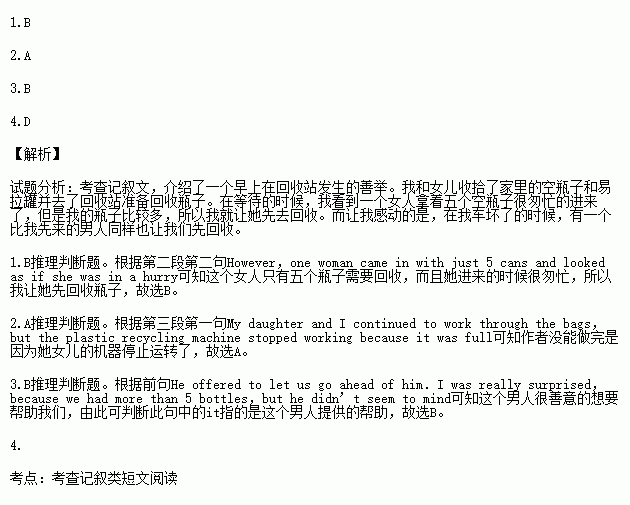题目内容
My daughter and I collected the empty cans and bottles in our home this morning.We had 6 full garbage bags later so I knew we would be spending a bit more of time at the recycling center.When we got there,a man and his kids were also doing the morning recycling and were using two of the four machines to recycle their plastic and cans.Luckily,we were able to use the 2 remaining machines.
Of course,there were others that came,but when they saw the two families with garbage bags full of recycled things,they quickly left.However,one woman came in with just 5 cans and looked as if she was in a hurry.So I stopped what I was doing and let her in to recycle her cans.Of course,she was grateful,and it felt good to let her go ahead of me.But that was not the whole story.
My daughter and I continued to work through the bags,but the plastic recycling machine stopped working because it was full.My daughter was left with nothing to do.The other family was still using the other two plastic recycling machines,but it seemed that they were almost done.I just told my daughter we would have to wait until they were done.But the man of the other family came through with another act of kindness.He offered to let us go ahead of him.I was really surprised,because we had more than 5 bottles,but he didn’t seem to mind.I happily accepted it.
It was great to give and then to get an act of kindness in turn.It was small,I didn't expect it,but it surely brightened up my day.
1.Why did the writer let the woman recycle her cans first?
A.Because there were many other families there.
B.Because the woman seemed to be in a hurry.
C.Because the writer wanted to hear a story.
D.Because the woman was very grateful.
2.Why couldn't the writer finish her recycling in time?
A.Because her daughter' s machine stopped working.
B.Because the other family was still using the machines.
C.Because she let the other family use her machine first.
D.Because she helped recycle the other family's bags first.
3.What does the underlined word "it" in Paragraph 3 refer to?
A.The kindness. B.The offer.
C.The machine. D.The 5 bottles.
4.Which of the following best describes the topic of this passage?
A.A good name is sooner lost than won.
B.A little is better than none.
C.All men cannot be first.
D.One good turn deserves another.
 愉快的寒假南京出版社系列答案
愉快的寒假南京出版社系列答案
